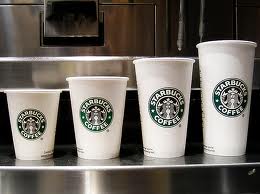If we're all so original, why are there so many Starbucks?
Most of us like to think we are kind of cool, interesting, hip, unique, and not at all as boring and predictable as the next person. This kind of attitude is perhaps more prevalent in the USA, where the ideas of rugged individualism, conquering the great untamed land and staking your own claim are still a part of the national psyche. We don't like to conform. We don't want to be told what to do. And we often chafe at what we sometimes perceive as artificial or arbitrary rules, policies, or regulations.
So why in this nation of free-thinking, freedom loving, don't you dare tell me what to do, think, feel, say, or buy kinds of people do we have so much sameness? Every town has a McDonalds and Starbucks, (usually more than one), you can score a $5 dollar Subway footlong everywhere, and in town after town a seemingly limitless string of non-descript strip malls remind you that even though you may be thousands of miles from home you have not gone very far.
A recent post on the Psychology Today Ulterior Motives blog titled 'Why We Love Independence, Individuality, and Starbucks' offers some ideas as to this apparent paradox - why we will sometimes travel across the globe only to seek out a cup of joe from Starbucks that we can easily get in our home towns. After reviewing some recent studies on the topics of mobility, choice, and familairity, the author offers the following observations to attempt to explain the seemingly contradiction:
The independent lifestyle that we often lead in the United States creates great freedom. But that freedom comes at the cost of our connection to community. When we move from place to place, we disrupt our connections to family and friends. We also force ourselves to adapt to a new house and a new environment.
In those times, we tend to attach ourselves to things that are familiar as an anchor. There are lots of things that we might use for that anchor. One of them is the places we shop. Shopping at a familiar chain store after moving provides a sense of balance to counteract the chaotic feelings we might have as we try to re-root ourselves in a new home.
Ok, that makes some sense. If you have relocated, left most all of your familiar surroundings and friends behind, then seeking out the relative sameness of chain stores, shops, or restaurants does certainly provide a level of comfort, and anchor of sorts as the piece describes. You may not know anyone in your new town, or at your new company, but that grande mocha with whipped cream will taste exactly the same as the one you used to get every morning on your way to your old job. And that is, mostly, a good thing. It's assuring, it's safe, maybe it is even control when everything else around you seems out of control. Starbucks and McDonalds are on every corner because we want them there, not really because there aren't better places in every town to get coffee and hamburgers.
So what's the hook back to work, or human resources, or anything at all relevant to the folks that might read this post?
Probably not much of one. Perhaps only that it might explain a little bit of why those unique, remarkable, and innovative corporate cultures we hear so much about (Zappos, Google, Netflix, etc.), seem to be the outliers, no matter how much they are discussed and analyzed. For all their notoriety and acclaim, the vast majority of us never get to work for those companies, the ones that are the corporate versions of that incredible hole in the wall local diner that makes the best handmade burgers and fries.
Most of us tend to spend out time at the corporate equivalent of the Starbucks. Good. Quality. Solid. And exactly the same wherever you go. And that is the experience we bring with us as we move through the world.

 Steve
Steve
Reader Comments (2)
Good post Steve, that hits on some huge issues. Urban sprawl is a problem (yes, I call it a problem) which is often driven by good corporate strategy to expand brands, markets and successful products. But, comes at a cost of every town looking and feeling the same. That compromises the uniqueness of our huge country (Denver should look and feel different than St. Pete Beach, Fl). That sameness also brings comfort as you pointed out, and that is incredibly powerful particularly during times of change.
Even Starbucks tries to make each store unique, but at tthe end of the day, you're still pulling into the parking lot with the big green sign. Keeping a unique edge to our work, and communities, is a both a challenge and opportunity even in an era of sameness.
Good stuff Steve.
Thanks so much Jay - excellent points and thanks for sharing them here.